For the 2025 school year, there is 1 public elementary school serving 127 students in Bertrand School District. This district's average elementary testing ranking is 4/10, which is in the bottom 50% of public elementary schools in Nebraska.
Public Elementary School in Bertrand School District have an average math proficiency score of 37% (versus the Nebraska public elementary school average of 46%), and reading proficiency score of 52% (versus the 47% statewide average).
Minority enrollment is 13% of the student body (majority Hispanic), which is less than the Nebraska public elementary school average of 39% (majority Hispanic).
Overview
This School District
This State (NE)
# Schools
2 Schools
686 Schools
# Students
241 Students
208,191 Students
# Teachers
24 Teachers
15,206 Teachers
Student : Teacher Ratio
10:1
10:1
District Rank
Bertrand School District, which is ranked within the bottom 50% of all 245 school districts in Nebraska (based off of combined math and reading proficiency testing data) for the 2021-2022 school year.
The school district's graduation rate of 80% has stayed relatively flat over five school years.
Overall District Rank
#176 out of 246 school districts
(Bottom 50%)
(Bottom 50%)
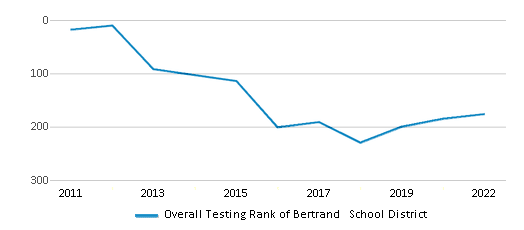
Math Test Scores (% Proficient)
35-39%
46%
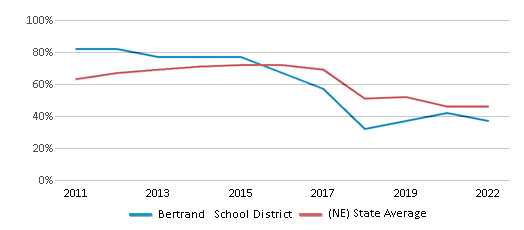
Reading/Language Arts Test Scores (% Proficient)
45-49%
47%
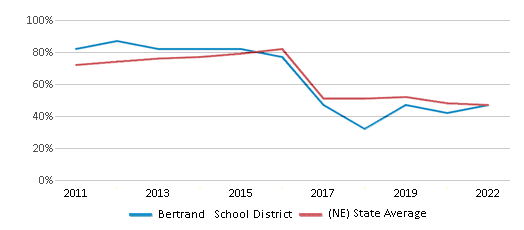
Science Test Scores (% Proficient)
50-59%
62%
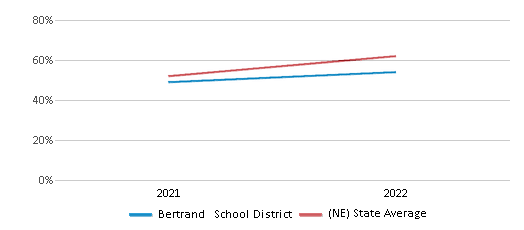
Graduation Rate
≥80%
87%
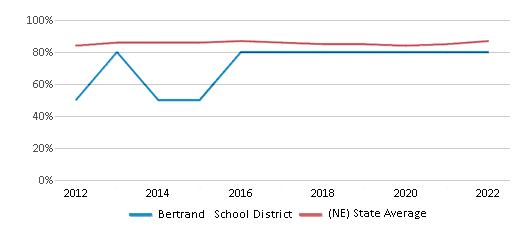
Students by Ethnicity:
Diversity Score
0.25
0.58
# American Indian Students
1 Student
2,870 Students
% American Indian Students
n/a
1%
# Asian Students
n/a
7,126 Students
% Asian Students
n/a
3%
# Hispanic Students
34 Students
46,954 Students
% Hispanic Students
14%
23%
# Black Students
n/a
13,800 Students
% Black Students
n/a
7%
# White Students
206 Students
126,646 Students
% White Students
86%
61%
# Hawaiian Students
n/a
359 Students
% Hawaiian Students
n/a
n/a
# Two or more races Students
n/a
10,436 Students
% of Two or more races Students
n/a
5%
Students by Grade:
# Students in PK Grade:
17
13,285
# Students in K Grade:
16
22,223
# Students in 1st Grade:
19
22,898
# Students in 2nd Grade:
16
23,457
# Students in 3rd Grade:
12
23,201
# Students in 4th Grade:
18
23,506
# Students in 5th Grade:
12
23,198
# Students in 6th Grade:
17
23,396
# Students in 7th Grade:
19
16,271
# Students in 8th Grade:
23
16,755
# Students in 9th Grade:
23
-
# Students in 10th Grade:
15
1
# Students in 11th Grade:
20
-
# Students in 12th Grade:
14
-
# Ungraded Students:
-
-
District Revenue and Spending
The revenue/student of $23,913 is higher than the state median of $15,464. The school district revenue/student has stayed relatively flat over four school years.
The school district's spending/student of $23,390 is higher than the state median of $16,776. The school district spending/student has stayed relatively flat over four school years.
Total Revenue
$6 MM
$5,080 MM
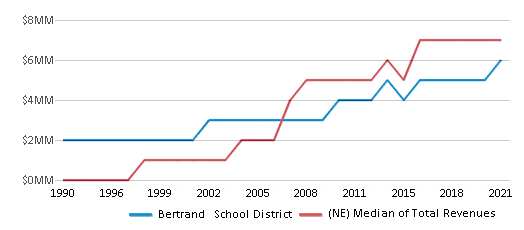
Spending
$6 MM
$5,511 MM
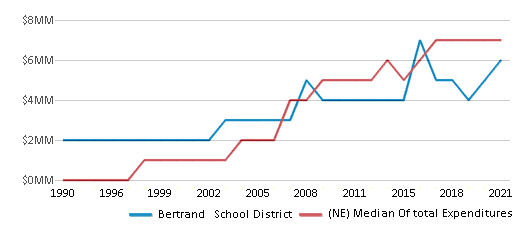
Revenue / Student
$23,913
$15,464
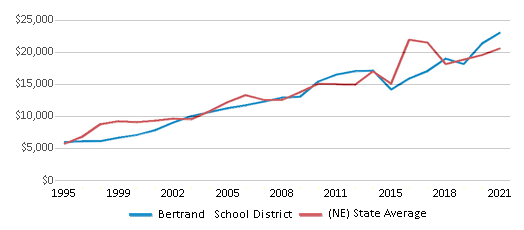
Spending / Student
$23,390
$16,776
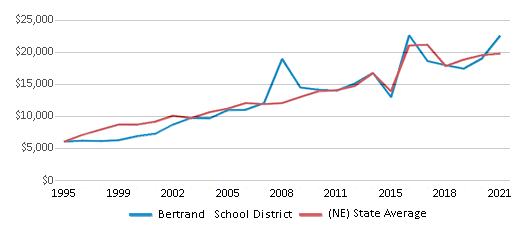
Best Bertrand School District Public Elementary Schools (2025)
School
(Math and Reading Proficiency)
(Math and Reading Proficiency)
Location
Grades
Students
Rank: #11.
Bertrand Elementary School
(Math: 35-39% | Reading: 50-54%)
Rank:
Rank:
5/
Bottom 50%10
503 School St
Bertrand, NE 68927
(308) 472-3427
Bertrand, NE 68927
(308) 472-3427
Grades: PK-6
| 127 students
Recent Articles

What Is A Charter School?
Explore the world of charter schools in this comprehensive guide. Learn about their history, how they operate, and the pros and cons of this educational innovation. Discover key facts about charter schools, including admission policies, demographics, and funding, as well as what to look for when considering a charter school for your child.

10 Reasons Why High School Sports Benefit Students
Discover the 10 compelling reasons why high school sports are beneficial for students. This comprehensive article explores how athletics enhance academic performance, foster personal growth, and develop crucial life skills. From improved fitness and time management to leadership development and community representation, learn why participating in high school sports can be a game-changer for students' overall success and well-being.

February 05, 2025
Understanding the U.S. Department of Education: Structure, Impact, and EvolutionWe explore how the Department of Education shapes American education, from its cabinet-level leadership to its impact on millions of students, written for general audiences seeking clarity on this vital institution.





